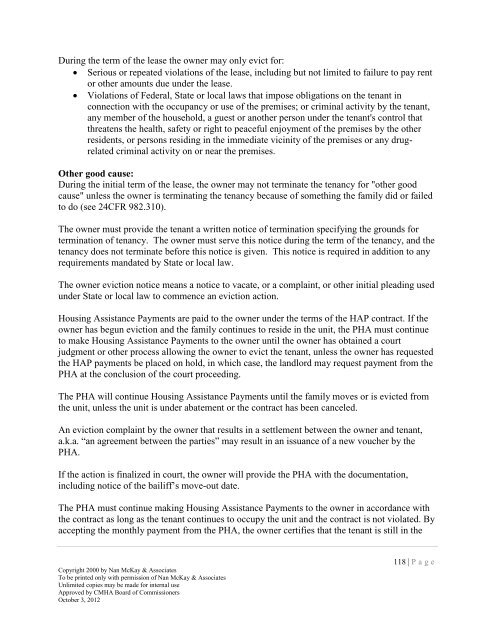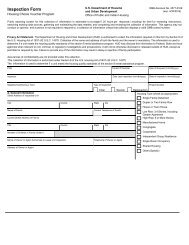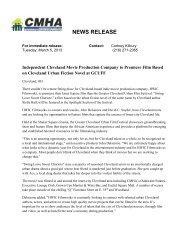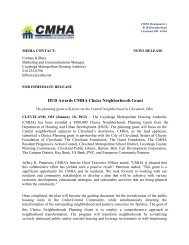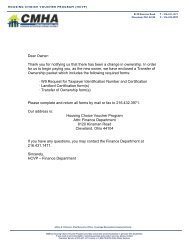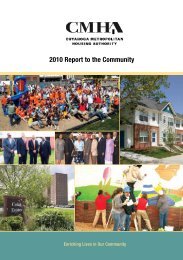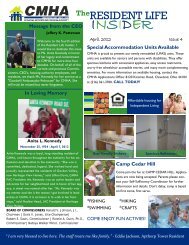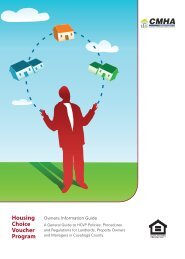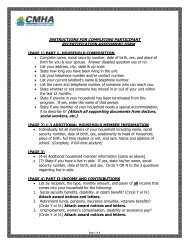2013 CMHA HCVP Admin Plan - Cuyahoga Metropolitan Housing ...
2013 CMHA HCVP Admin Plan - Cuyahoga Metropolitan Housing ...
2013 CMHA HCVP Admin Plan - Cuyahoga Metropolitan Housing ...
Create successful ePaper yourself
Turn your PDF publications into a flip-book with our unique Google optimized e-Paper software.
During the term of the lease the owner may only evict for:<br />
Serious or repeated violations of the lease, including but not limited to failure to pay rent<br />
or other amounts due under the lease.<br />
Violations of Federal, State or local laws that impose obligations on the tenant in<br />
connection with the occupancy or use of the premises; or criminal activity by the tenant,<br />
any member of the household, a guest or another person under the tenant's control that<br />
threatens the health, safety or right to peaceful enjoyment of the premises by the other<br />
residents, or persons residing in the immediate vicinity of the premises or any drugrelated<br />
criminal activity on or near the premises.<br />
Other good cause:<br />
During the initial term of the lease, the owner may not terminate the tenancy for "other good<br />
cause" unless the owner is terminating the tenancy because of something the family did or failed<br />
to do (see 24CFR 982.310).<br />
The owner must provide the tenant a written notice of termination specifying the grounds for<br />
termination of tenancy. The owner must serve this notice during the term of the tenancy, and the<br />
tenancy does not terminate before this notice is given. This notice is required in addition to any<br />
requirements mandated by State or local law.<br />
The owner eviction notice means a notice to vacate, or a complaint, or other initial pleading used<br />
under State or local law to commence an eviction action.<br />
<strong>Housing</strong> Assistance Payments are paid to the owner under the terms of the HAP contract. If the<br />
owner has begun eviction and the family continues to reside in the unit, the PHA must continue<br />
to make <strong>Housing</strong> Assistance Payments to the owner until the owner has obtained a court<br />
judgment or other process allowing the owner to evict the tenant, unless the owner has requested<br />
the HAP payments be placed on hold, in which case, the landlord may request payment from the<br />
PHA at the conclusion of the court proceeding.<br />
The PHA will continue <strong>Housing</strong> Assistance Payments until the family moves or is evicted from<br />
the unit, unless the unit is under abatement or the contract has been canceled.<br />
An eviction complaint by the owner that results in a settlement between the owner and tenant,<br />
a.k.a. “an agreement between the parties” may result in an issuance of a new voucher by the<br />
PHA.<br />
If the action is finalized in court, the owner will provide the PHA with the documentation,<br />
including notice of the bailiff’s move-out date.<br />
The PHA must continue making <strong>Housing</strong> Assistance Payments to the owner in accordance with<br />
the contract as long as the tenant continues to occupy the unit and the contract is not violated. By<br />
accepting the monthly payment from the PHA, the owner certifies that the tenant is still in the<br />
Copyright 2000 by Nan McKay & Associates<br />
To be printed only with permission of Nan McKay & Associates<br />
Unlimited copies may be made for internal use<br />
Approved by <strong>CMHA</strong> Board of Commissioners<br />
October 3, 2012<br />
118 | P a g e


